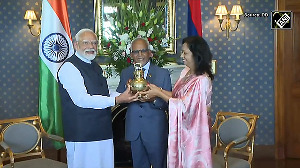 When India's Commerce and Industry Minister Anand Sharma met his counterpart in Beijing last year, he spoke mainly about India's yawning trade deficit and China agreed that this was a problem that needed fixing.
When India's Commerce and Industry Minister Anand Sharma met his counterpart in Beijing last year, he spoke mainly about India's yawning trade deficit and China agreed that this was a problem that needed fixing. The trade deficit has since got bigger and Indian businesses complain that they still play on a non-level playing field when it comes to China.
Yet, when the deputy chairman of the Planning Commission, Montek Singh Ahluwalia, sat down with his counterpart, Zhang Ping, chairman of the National Development and Reform Commission, they chose to focus on the big picture, the long run and the global situation, avoiding the thorny subject of bilateral trade.
After conducting what was officially described as "an in-depth and frank exchange of views on the world economic situation, respective domestic macro-economic situations, the goals and implementation of the mid- and long-term economic and social development plans of the two countries as well as their respective industrial, fiscal and monetary policies", the two sides agreed to "enhance pragmatic co-operation in economic sectors".
The communiqué did not define what was meant by "pragmatic co-operation". Apart from ensuring that their own economies continue to grow, neither was able to spell out what else they could
The specific areas identified for closer co-operation included energy efficiency, conservation and climate change, infrastructure development (especially railways), water conservation and development of clean water technologies.
Both countries agreed to "stay committed to deepening bilateral investment cooperation, further opening markets, and improving the investment environment in India and China so as to lay a solid foundation for pragmatic co-operation between the businesses of the two countries on the basis of complementarities, mutual benefit and win-win outcomes". All this sounds good, but how China proposes to move ahead on this positive agenda without reducing the yawning trade deficit is not clear.
The bottom line for closer co-operation, and "strategic co-operation", on the economic side would be for China to address India's concerns about the trade gap.
Last year China said it hoped to address the trade gap problem by investing more in India and exporting out of India.
This would require India to be more hospitable to foreign direct investment from China, especially in the export and import-substituting sectors.
Hopefully, the newly created India-China CEOs forum, headed by Anil Dhirubhai Ambani on the Indian side, will find a way forward to facilitate this.










 © 2025
© 2025